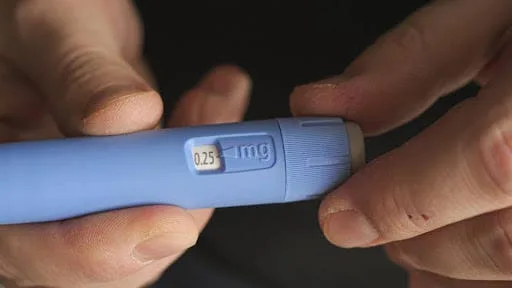[ad_1]
Table of Contents
tocState.toggleTocShowMore ? ‘Show more’ : ‘Show less’
Amid soaring demand and ongoing drug shortages, the Food and Drug Administration (FDA) has approved a new medication for weight loss, Zepbound, made by Eli Lilly and Co. The drug joins a list of six other similar drugs that are FDA-approved. Like Novo Nordisk’s Ozempic and Wegovy, Zepbound belongs to a class of medications called GLP-1 agonists.
The approval marks an advancement in the field of obesity medicine, according to some obesity experts. “This medication is the most efficacious of all the anti-obesity medications that we have in our toolbox,” says Amanda Velazquez, M.D., assistant professor of surgery and medicine and director of obesity medicine at Cedars-Sinai in Los Angeles.
This new approval is “unbelievably exciting,” notes Katherine H. Saunders, M.D., co-founder of Intellihealth, an obesity treatment company, and clinical assistant professor of medicine at Weill Cornell Medicine in New York.“It will truly be life-changing for many individuals with obesity who have tried unsuccessfully for years or decades to lose weight and keep it off,” she adds.
In this article, we explore what Zepbound is, how it works, what sets it apart from other options and what you need to know before considering it as a treatment.
What is Zepbound?
Zepbound is the brand name for tirzepatide, an ingredient already approved under the brand name Mounjaro for lowering blood sugar in adults with type 2 diabetes. The medication is what Dr. Saunders calls a dual agonist because it targets two hormones—glucagon-like peptide-1 (GLP-1) and glucose-dependent insulinotropic polypeptide (GIP)—to reduce feelings of hunger and decrease food intake. The medication helps “patients feel fuller faster and for longer,” adds Raoul Manalac, M.D., senior director of clinical experience at Ro, a company offering at-home medical treatment.
The only difference between Mounjaro and Zepbound is the brand name and what they are FDA-approved to treat: Mounjaro is FDA-approved for type 2 diabetes and Zepbound is approved for weight loss in individuals with obesity (a body mass index of 30 or above) or overweight (a body mass index of 27 or above). Both drugs are once-weekly injections of tirzepatide.
Zepbound vs. Wegovy and Ozempic
Zepbound is different from Ozempic and Wegovy, which are GLP-1 agonists that contain semaglutide. Because Ozempic and Wegovy act on one hormone instead of two, they may be slightly less effective for weight loss. According to Dr. Saunders, research shows that Zepbound can lead to at least a 22% total body weight loss (at 72 weeks) compared with 15% for Wegovy (at 68 weeks).
How Does Zepbound Work?
Zepbound works by mimicking two hormones (GLP-1 and GIP) made by the intestines. These two gut hormones are essential to the body, and they improve feelings of fullness and insulin sensitivity and delay gastric emptying (the time it takes for food to leave the stomach for the small intestines), explains Dr. Velazquez.
In a double-blind, randomized, controlled trial, the highest dose of tirzepatide (15 milligrams) resulted in a 22.5% reduction in weight, or 52 pounds, over the course of 72 weeks. Lower doses of 10 milligrams and 5 milligrams also showed weight reduction. While these results are very encouraging, it’s worth noting that the study was funded by Eli Lilly.
Another double-blind, placebo-controlled trial examined the effects of tirzepatide on weight loss after participants were enrolled in an intensive lifestyle intervention program for weight loss and then either given tirzepatide or a placebo at random. The group receiving tirzepatide in addition to lifestyle intervention had a weight loss of 26.6% compared with a weight loss of 3.8% for those given the placebo.This research also received funds from Eli Lilly.
In order to be effective for weight reduction and management, Eli Lilly notes that Zepbound should be used in combination with a reduced-calorie diet and increased physical activity.
Who Can Use Zepbound?
The FDA approved Zepbound for chronic weight management in adults with obesity (a body mass index of 30 or above) or overweight (a body mass index of 27 or above) with one or more weight-related conditions, such as type 2 diabetes, high blood pressure or high cholesterol.
While the drug shows promising results, Dr. Saunders stresses that there’s no one-size-fits-all treatment for obesity. “Zepbound might work beautifully for some individuals with obesity and not at all for others,” she adds.
Some reasons Zepbound may not be right for you, according to Dr. Saunders, include:
- You have a fear of needles (the medication requires weekly injections)
- You’re not interested in long-term medical management
- You have a history of pancreatitis or are at risk of pancreatitis
- You have gastroparesis (a rare condition that slows or stops movement from the stomach to the small intestine)
- You have a personal or family history of medullary thyroid cancer or multiple endocrine neoplasia syndrome type 2 (GLP-1 receptor agonists can cause thyroid C-cell tumors in rats, but there are no reported cases in humans)
Some of the possible side effects of Zepbound, according to the FDA, include:
- Diarrhea
- Nausea
- Vomiting
- Constipation
- Abdominal discomfort and pain
- Injection site reactions
- Fatigue
- Allergic reactions (typically fever and rash)
- Burping
- Hair loss
- Gastroesophageal reflux disease.
How Much Does Zepbound Cost?
The list price for Zepbound from Eli Lilly is $1,059.87, which the company says doesn’t reflect what people may pay with insurance coverage. Eli Lilly also notes a savings card program as coming soon on its Zepbound website.
Is Zepbound Covered by Insurance?
Whether Zepbound is covered by insurance depends on the plan. Now that the drug has received FDA approval, Dr. Manalac says it’s likely that insurance will cover the medication for some patients.
Zepbound’s website states that those with commercial insurance coverage for the drug may be eligible to pay as little as $25 for a one-month or three-month supply with a Zepbound savings card.
Talking to Your Doctor About Zepbound
Zepbound (and others in its drug class) isn’t meant to be a temporary weight loss solution—something Dr. Velazquez feels is not emphasized enough. These medications are intended to be taken for life to manage the chronic condition of obesity. She tells people that while they may need to take Zepbound for life, the health benefits of maintaining a 22% loss of body weight can mean getting off blood pressure medication or a type 2 diabetes medication.
Since the medication needs to be continued once you start it and can have serious side effects, it’s important to understand how it works and the potential risks and benefits for you. Dr. Saunders recommends talking to your provider about how to adjust eating behavior to minimize side effects and how to identify early warning signs way before serious adverse events occur.
Powerful, Effective Weight Loss With Ro
The Body Program from Ro offers coaching, metabolic testing, insurance coverage support and GLP-1 medication to help you lose weight and feel healthier.
[ad_2]



